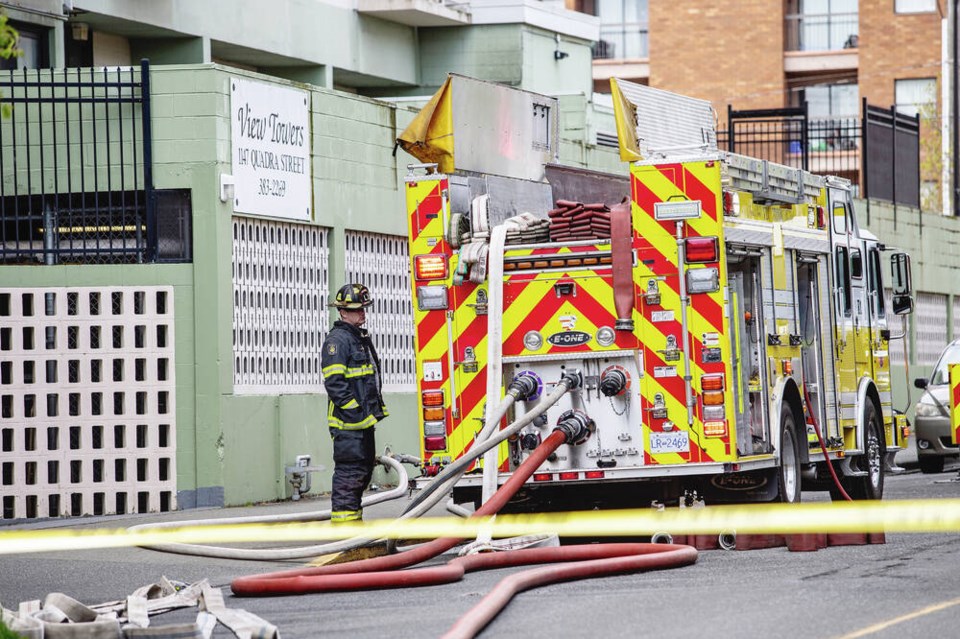Picture this scenario: A Greater Victoria highrise catches fire.
National standards say any time there’s a blaze in a building taller than seven storeys, at least 49 firefighters should be on scene within eight minutes.
Except there’s no way any single fire department can deploy that many people. Saanich can have as few as 19 firefighters on duty. In Victoria, the minimum is 17. To reach the necessary number, firefighters from Oak Bay and Esquimalt would have to race in, too.
Local departments do, in fact, help each other when requested. It can be a bit awkward, though, thanks to fragmented communications and a patchwork of inter-municipal agreements.
Funny, this doesn’t get talked about much. You could fill a small lake with all the ink spent debating police amalgamation. But fire services? Barely a hot tub’s worth.
Saanich Coun. Colin Plant wants to change that. He thinks his municipality, Victoria, Esquimalt and Oak Bay should consider marrying their fire departments.
“I don’t believe there’s a necessity for four separate departments in the core,” Plant says. Erasing the borders could make for a safer community.
Saanich Fire Chief Mike Burgess thinks Plant is on the right track. “There’s a lack of efficiency and co-operation in the way it’s structured,” is Burgess’s view of the current system. Cross-border complexities create hurdles that need not exist.
That said, Burgess adds, this is a political matter that is up to politicians to sort out.
OK, but parochial politics haven’t necessarily led to the best way of doing things. In 2020, a 40-year-old mutual-aid agreement in which local departments can ask for each other’s help fighting big fires almost fell apart when Victoria, which felt it was giving more than it was getting, threatened to walk away.
In the end, Victoria, Saanich and Oak Bay agreed to a model in which a department gets its costs covered if it helps one of the others for more than an hour. (Esquimalt reached a separate agreement with Victoria, but not the other two, as it also has a deal with the fire department at the naval base.)
The down side of the fee-for-service model, critics say, is that budget considerations could complicate a department’s decision to ask for the assistance it needs.
Politics have also been at play in figuring out who handles fire calls. A few years ago, five municipalities — Esquimalt, View Royal, Colwood, North Saanich and Sidney — ditched Saanich’s fire-dispatch centre in favour of the one across the water in Surrey.
Langford and Victoria now go through Surrey, too. Calls from Oak Bay, Central Saanich and the CRD, which has 15 departments under its umbrella, are dispatched from Saanich. It can make for “clunky” communications when departments are trying to deal with each other, Burgess says.
Politics also scuttled a previous attempt at a merger. In 2002, when the provincial government forced the end of Esquimalt’s troubled police-fire department, pushing the police side into a shotgun marriage with VicPD, Esquimalt and Victoria had a separate agreement to merge their fire departments. Before the agreement could come into effect, though, a newly elected Esquimalt council backed out of the deal, leading Victoria to sue Esquimalt.
Plant wonders why everyone doesn’t just dump the cumbersome inter-municipal agreements and, instead, combine forces and deploy firefighters as needed. If a Saanich-based firetruck can get to a bad car crash faster than a Victoria one can, who cares where the border is? The public sure doesn’t, Plant says. “The region wants us to co-operate.”
To Plant, the goal isn’t necessarily to save money, but to avoid reliance on tenuous inter-jurisdictional deals that can be torn up any time the political winds change.
A merged department would still need the same halls in the same places, and the same number of firefighters, he says. “No frontline firefighter is losing their job in this proposal.”
There would be changes at the top, though. “Inevitably, three of the four chiefs will not be chief,” he said.
Saanich has three fire halls, 132 uniformed firefighters and seven support staff. Victoria has three fire halls and a total of 120 firefighters and civilian staff.
Esquimalt has 27 firefighters and a civilian. Oak Bay has 26 and two. (Why limit the discussion to the four core departments? Because they’re staffed solely by full-time firefighters. It would be trickier to include departments that use volunteers.)
Combining local emergency services has actually been in Saanich’s strategic plan for the past four years (though council has traditionally been hinky about wedding its police department with that of Victoria, the fear being that the latter would suck all the resources downtown where the action is).
When the municipality’s newly elected council looks at the plan Dec. 3, Plant will ask his colleagues if they want to keep the item on the list and move the ball forward.
Even if Saanich council likes the idea, barriers would remain. For one, amalgamating fire departments isn’t on the radar screen of Victoria’s rookie-heavy new council, which already faces a huge learning curve without diving into this.
Still, Plant wants to get people thinking. “It’s worth having the conversation to see if amalgamation is possible.”



